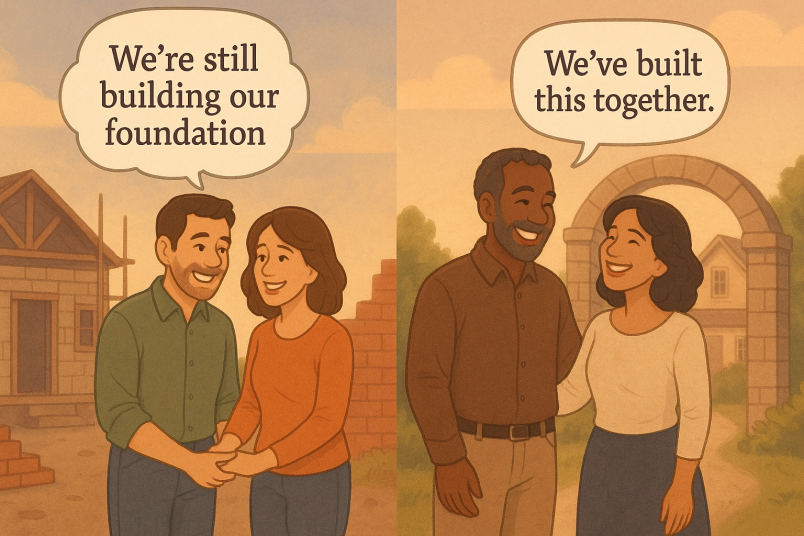What’s the Difference Between Capstone vs. Cornerstone Marriages?

Unlock Daily 30-Sec Tips for a Happier Relationship
👉 Subscribe FREEKey Takeaways
Marriage.com AI Quick Summary
Marriage hasn’t always meant the same thing to everyone. For some, it’s the very foundation they build their lives upon—sharing dreams, struggles, and victories along the way. For others, it’s the final touch, the “capstone” added after careers, independence, and personal growth feel settled.
So, which path makes sense, and does one truly lead to more happiness? Life, of course, isn’t that simple… Capstone vs cornerstone marriages reveal how deeply timing shapes the way we love, support, and grow with a partner.
One isn’t automatically better; it’s about understanding the story you’re writing—together or a little later!
What is a capstone & cornerstone marriage?
A capstone marriage is when marriage comes later in life, after people feel they’ve already achieved independence, financial stability, and personal growth.
A cornerstone marriage, on the other hand, is when marriage is seen as the starting point—the foundation from which two people build their lives together.
The research published in 2010 examined the connection between the age at which people marry. If you marry very young (before your early 20s), your marriage is more likely to struggle or end in divorce.
If you marry much later (after your late 20s or 30s), your marriage is more likely to last, but couples often report feeling less happy or connected.
Example: A couple who marries in their early twenties might grow through school, jobs, and struggles side by side (cornerstone), while another couple in their thirties may wait until they both feel “ready” with stable careers and then tie the knot (capstone).
Please note:
There’s no single right way to approach love. Whether you find yourself leaning toward cornerstone vs capstone marriage, what matters most is the care, respect, and shared values that shape the journey—not the timeline.
Capstones vs. cornerstones: What’s the difference
Marriage has changed over time, and the way we see it often falls into two models—capstone vs cornerstone.
A research paper published in The National Marriage Project states that about 70–80% of people aged 18–33 believe delaying marriage brings benefits like maturity, financial readiness, and better preparation.
| Point of difference | Capstone marriage | Cornerstone marriage |
|---|---|---|
| Maturity & readiness | Marrying later in life for them ensures that both sides are more mature. | A marriage built on a cornerstone does not negate the necessity of reaching a specific level of maturity before getting married. |
| Partner evaluation & preparation | It gives couples more time to evaluate the chances of a marriage with a potential partner. | Couples choose careful match selection and purposeful preparation for the institution of marriage. |
| Focus & identity | They want to feel complete and at ease within themselves before anything else. | The couple focuses on the process of forging a "we-identity." |
| Challenges & risks | Marrying later can reduce shared experiences, heighten expectations, and complicate adjustment to a partnership. | One challenge faced by cornerstone marriages is the gradual drifting apart of the couple. |
| Tradition & social View | Marriage is the final step after building education, career, and independence — a reward once other milestones are achieved. | Marriage is viewed as the foundation of adulthood — the starting point for building a life, family, and shared future together. |
Why do people choose cornerstone marriage: 5 reasons
Even though marriage trends are shifting, many still see marriage as the cornerstone—a foundation to build their lives on rather than a final step.
When we compare capstone vs cornerstone, it’s clear that cornerstone marriages reflect values of shared growth, teamwork, and stability. Let’s explore why this choice continues to make sense for so many.
1. Building a life together from the start
For many, a cornerstone marriage means they don’t wait to have everything figured out before committing. They believe marriage should be the first block laid, not the last brick.
This approach allows couples to share life’s highs and lows, supporting each other while figuring out careers, finances, and goals along the way. Starting early doesn’t mean being unprepared; it means growing into adulthood together.
- Example: A couple marries at 22 and navigates graduate school, first jobs, and their first apartment side by side.
2. Emotional growth through partnership
One of the strongest reasons for deciding capstone vs cornerstone marriage is the belief that love matures when tested by life’s real challenges. Couples learn patience, empathy, and problem-solving skills together.
By facing difficulties earlier in life, they often develop a strong emotional bond that feels hard to replicate later. This growth can become the glue that sustains their relationship for decades.
- Example: A pair in their early twenties deals with tight budgets and learns how to prioritize communication over financial stress.
3. Shared milestones create a deeper connection
Cornerstone marriages let couples experience “firsts” together—buying a house, traveling, or raising children. Sharing these moments strengthens their sense of unity and builds a shared story.
Instead of arriving at marriage with separate identities fully formed, they create their identity as a team. This focus on “we” over “me” is one of the biggest differences in a cornerstone vs capstone marriage.
- Example: A couple moves into their first home and learns the value of joint decision-making about money and lifestyle.
4. Stability and family support
In many cultures, marriage is still viewed as the proper foundation for starting a family. Couples who marry earlier often feel supported by tradition and community.
Families may be more involved, providing emotional and practical support that helps couples establish themselves. This stability makes it easier to navigate uncertain times, like job changes or economic struggles.
- Example: Parents help with childcare, allowing the couple to balance work and home without burning out.
5. A cultural and personal choice
Choosing between a capstone vs cornerstone marriage can also be a way of holding onto tradition in a world where independence is highly valued.
It represents resistance to the idea that happiness must come only after full personal achievement. For these couples, a cornerstone vs capstone relationship is not about rushing—it’s about prioritizing shared growth over individual milestones. They see marriage as a starting line, not a finish line.
- Example: Two young adults marry after college because they value building a partnership more than waiting until every career goal is complete.
Why do people choose a capstone marriage: 5 reasons
In today’s world, many people view marriage not as the first step into adulthood but as the final piece of the puzzle. This is the idea of a capstone marriage—a relationship entered after achieving personal stability, education, and independence.
When compared to the capstone vs cornerstone, the capstone path reflects a mindset of preparation, maturity, and readiness before saying “I do.”
1. Personal and financial independence
People who decide between a capstone vs cornerstone marriage often want to establish themselves first—financially, professionally, and personally. They see independence as an important foundation before merging lives with a partner.
This way, marriage becomes a choice of love rather than a necessity. It also helps reduce stress around money and life direction.
- Example: A woman waits until her late twenties to finish grad school, secure her career, and pay off student loans before marrying.
2. Greater maturity and self-awareness
By marrying later, individuals usually have a stronger sense of who they are and what they want. They’ve had time to explore their goals, values, and lifestyle preferences.
This self-awareness reduces the likelihood of rushing into mismatched relationships. Maturity often translates into better communication, conflict resolution, and realistic expectations in marriage.
- Example: A man in his thirties enters marriage after years of travel and career building, confident in his priorities and emotional needs.
3. More thoughtful partner selection
Capstone marriages often come after years of dating and self-reflection. Instead of settling early, people wait until they feel confident about choosing a lifelong partner.
This increases the chances of compatibility in values, lifestyle, and future goals. Careful partner selection reduces the risk of divorce and long-term dissatisfaction.
- Example: A couple in their early thirties marries after dating for four years, having had open conversations about finances, children, and shared values.
Watch this TED Talk by Alexandra Redcay, a mental-health expert who shares how falling quickly in love, ignoring red flags, and resisting honest feedback from friends often lead to choosing the wrong partner.
4. Stability before family planning
Many people delay marriage because they want to be fully prepared for raising children. Entering marriage later often means they can offer their future family financial security, emotional stability, and a clear vision for parenting. They see this stability as a gift to themselves and their children.
- Example: A couple marries at 30 after buying a home and building savings, feeling ready to start a family in a stable environment.
5. A cultural shift in how marriage is viewed
Capstone marriages also reflect broader cultural changes. Instead of seeing marriage as the start of adulthood, many now see it as the “capstone” achievement once other milestones are completed.
This shift creates a new definition of adulthood where marriage is a celebration of being ready, not a requirement. In a cornerstone vs capstone relationship, this difference is central to how couples view commitment.
- Example: A professional couple waits until their careers are established and their goals align, then celebrates marriage as a milestone of success and stability.
Please note:
No matter which type of marriage you choose, what truly matters is your happiness. Trust yourself, trust your partner, and don’t be afraid to take the risks together.
Choosing Love
Whether you lean toward a cornerstone or a capstone marriage, the truth is there’s no single formula for lasting love. Some couples thrive by growing together early, while others find strength in waiting until they feel “ready.”
What matters most is not the timeline, but the trust, care, and commitment you bring into the relationship. Marriage is less about when you begin and more about how you show up for each other—through growth, challenges, and joy—day after day.
 Tips
Tips
Write your tip or submit a video tip
All tips are reviewed before the publishing.
Share this article on
Planning to get married?
Just engaged or contemplating marriage? Discover how to transition smoothly into the next phase of your relationship with Marriage.com's Pre-Marriage Course. Begin your incredible journey with this guide designed by experts and lay a strong foundation for your path of togetherness - forever!
Recent Articles
Related Quizzes
Unlock Daily 30-Sec Tips for a Happier, Healthier Relationship
👉 Subscribe FREE on YouTube We'd love your feedback!
We'd love your feedback!
 Expert Q&A
Expert Q&A
Ask your question related to this topic & get the support you deserve from experts.



















 Thanks for your feedback!
Thanks for your feedback!